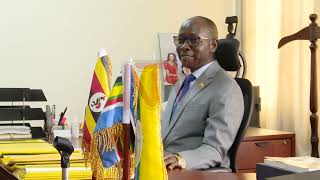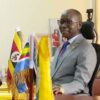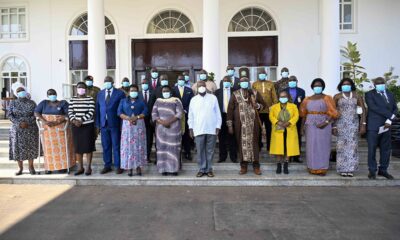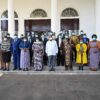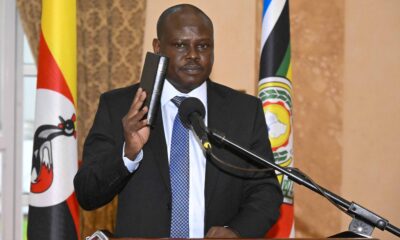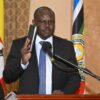News
NRM EALA Aspirants case dismissed with Costs
High Court has dismissed with costs an application by 23 National Resistance Movement-NRM party members challenging the decision by the party to lock them out of the East African Legislative Assembly-EALA elections. Civil Division High Court Judge Musa Ssekaana dismissed the application in his ruling delivered via email noting that it was filed prematurely since the applicants did not exhaust the internal mechanisms provided within the party constitution to resolve election disputes.
The applicants are Dr. Isaac Lwanga Byangire, Nuwabiine Jossy, Maganda Julius, Nuwagaba Herbert, Samuel Mugenyi, Kyasiimire Sheilah, Amanya German, Kyaguna Robert, Abigaba Adonia, Mivule Ronald, and Nampwera Ambrose. The others are Kizito Richard, Ategeka Moses, Webale Robert, Kawooya Kigongo Samuel, Isa Kato, Ruth Karungi, Agaba Gilbert, Rwebisengye L.B, Asimwe Micheal, Dr. Kisembo Emmanuel, Ivan Mutsika and Bwengye Lauben.
They petitioned the high court on July 14th, 2022 challenging the decision of the NRM Central Executive Committee, the party’s top organ to ring-fence six out of the nine EALA positions reserved for Uganda for the incumbent legislators. The incumbents include Mary Mugyenyi, Rose Akol, Stephen George Odongo, Denis Namara, James Kakooza, and Paul Musamali Mwasa.
In their application through their lawyers led by Robert Rutaro, the applicants said the contentious decision was reached on July 8th 2022 and communicated in a letter issued by the NRM Secretary General, Richard Todwong. Rutaro told the Court that his clients had expressed interest in participating in the elections, invested resources both cash and time and traversed almost all parts of the country seeking support from the legislators only to be locked out by the CEC decision.
The Court heard that the applicants were disenfranchised, made losses, and were denied an opportunity to participate in the elections contrary to the party constitution. Rutaro asked Court to quash the decision by CEC saying it is irrational, unreasonable, and procedural improper and allow his clients to participate in the forthcoming elections.
On their part, the defense team led by Usama Sebuufu and Anthony Mbaziira asked the Court to dismiss the application with costs on grounds that the applicants failed to mechanisms provided within the party Constitution to solve disputes. Mbaziira argued that the party constitution requires those aggrieved by party decisions to use the election tribunal to seek redress before rushing to court, which the applicants didn’t do.
He also noted that when NRM called for interested parties to express interest in EALA elections, 130 people responded, 63 withdrew and the remaining 67 who included the applicants were all assessed and six of them were endorsed as party candidates. However, in his decision, Ssekaana agreed with the respondents and dismissed the application saying it was an abuse of the Court process, premature, and therefore baseless.
According to Ssekaana, the application seemed to be avoiding the existing remedy or procedures set out under the NRM Party which says that there shall be Election Tribunals at the National level and at lower levels of authority as per the party Regulations of 2020. Ssekaana said that those Election Dispute Tribunals govern the internal party processes and that they ought to have been exhausted by the applicants which they failed to do.
“Matters relating to the nomination of a candidate of a political party are regarded as domestic affairs and are generally treated as not justiciable. The courts have no power to compel a political party to sponsor a candidate outside the thin and limited powers conferred under the political parties and Organizations Act. The question of nomination of candidates for elective offices from members of a political party is governed by the rules, guidelines, and condition of the political party concerned. ” said Ssekaana.
He says the applicants also participated in the nomination exercise and the party chose whom it found to be suitable to represent it and couldn’t select all the participants as such, the applicants cannot, therefore, challenge the guidelines that they knew well about from the start. “The applicants accepted to take part in the electoral process through the party guidelines which required vetting by Central Executive Committee, they cannot approbate and reprobate by challenging the same system they allowed to be part of at this later stage”, said Ssekaana.
According to Ssekaana the matter that was before him was a political question and therefore the vetting of candidates was necessary and the court cannot go ahead to determine whether the decision by CEC was illegal.
“The NRM party Central Executive Committee -CEC in the exercise of their constitutional mandate or discretion took a decision in the best interest of the party. The available alternative procedure to challenge their decision is the most appropriate since it is an election complaint within the party structures” added Ssekaana.
He added that ” Every litigant who approaches the Court must come forward not only with clean hands but with a clean mind, clean heart and with a clean objective. It is settled principle that where there is an effective alternative remedy under the statute, the High Court does not exercise its jurisdiction as a self-imposed restriction”.
According to Ssekaana “if the applicants feel aggrieved by the decision of CEC and they feel that they cannot politically breathe, then they are at liberty to leave the party in order to breathe freely.” The applicant’s lawyers couldn’t be reached for a comment on what’s the next step for their clients since the election process resumes this month.
Elected representatives to EALA from the 7 member states of Kenya, Rwanda, Tanzania, Uganda, South Sudan, Burundi, and new entrant the Democratic Republic of Congo – DRC serve a five-year-tenure. The current 4th Assembly has 62 members, whose term commenced in 2017 and expires in the month of August.
According to Article 50 of the East African Community Treaty, members are elected by their respective country’s national legislature. Article 50 also requires the said members to reflect their country’s political parties, opinions, gender composition, and other special groups.
URN



